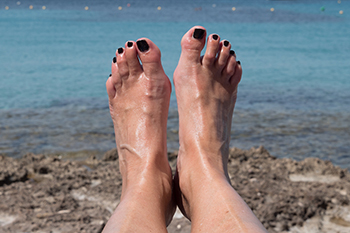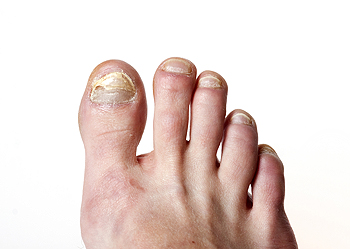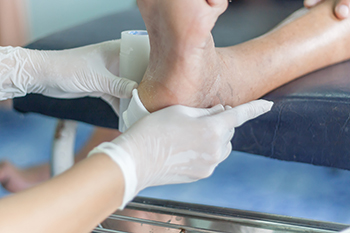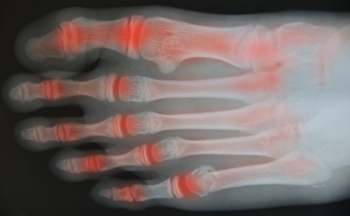(410) 764-7044
6506 Reisterstown Road, Baltimore
1205 York Road, Lutherville
6305 Belair Road, Baltimore
7809 Wise Avenue, Dundalk
November 2024
Common Foot Issues

Your feet are incredible structures, made up of 26 bones, 33 joints, and over 100 muscles, tendons, and ligaments, all working together to support your body’s weight and help you move. Despite their complexity, feet are often overlooked until something goes wrong. Common foot issues include corns, which are thickened areas of skin that form from pressure, and ingrown toenails, which can cause pain and infection when the nail grows into the surrounding skin. Toenails grow slower than fingernails, typically about 1/8 inch per month, which is why toenail care requires extra attention. Poor nail trimming or wearing ill-fitting shoes can lead to uncomfortable conditions over time. A podiatrist can help diagnose and treat a wide range of foot and toenail issues. This foot doctor can offer relief from pain, recommend proper footwear, and provide expert care for conditions like corns or ingrown toenails. If you are experiencing foot problems, it is suggested that you schedule an appointment with a podiatrist today.
Everyday foot care is very important to prevent infection and other foot ailments. If you need your feet checked, contact one of our podiatrists from Plaza Podiatry. Our doctors can provide the care you need to keep you pain-free and on your feet.
Everyday Foot Care
Often, people take care of their bodies, face and hair more so than they do for their feet. But the feet are a very important aspect of our bodies, and one that we should pay more attention to. Without our feet, we would not be able to perform most daily tasks.
It is best to check your feet regularly to make sure there are no new bruises or cuts that you may not have noticed before. For dry feet, moisturizer can easily be a remedy and can be applied as often as necessary to the affected areas. Wearing shoes that fit well can also help you maintain good foot health, as well as making it easier to walk and do daily activities without the stress or pain of ill-fitting shoes, high heels, or even flip flops. Wearing clean socks with closed shoes is important to ensure that sweat and bacteria do not accumulate within the shoe. Clean socks help to prevent Athlete’s foot, fungi problems, bad odors, and can absorb sweat.
If you have any questions please feel free to contact our offices located in Baltimore, Lutherville, and Dundalk, MD . We offer the newest diagnostic and treatment technologies for all your foot and ankle needs.
Dealing With Toenail Fungus

Toenail fungus, or onychomycosis, is caused by fungi that invade the nail bed, leading to discoloration, thickening, and even crumbling of the nail. Factors contributing to this infection include warm, moist environments, improper foot hygiene, and underlying health issues like diabetes or a weakened immune system. Symptoms often include yellow or brown discoloration, a foul odor, and discomfort in severe cases. Treatment options range from topical antifungal medications to oral prescriptions and, in persistent cases, laser therapy or nail removal. A podiatrist specializes in foot health and can accurately diagnose toenail fungus, recommend effective treatments, and provide advice on preventing future infections. If you suspect you have toenail fungus, consider scheduling an appointment with a podiatrist. Early intervention can help restore your nail health and prevent complications, allowing you to enjoy healthy, beautiful feet again.
If left untreated, toenail fungus may spread to other toenails, skin, or even fingernails. If you suspect you have toenail fungus it is important to seek treatment right away. For more information about treatment, contact one of our podiatrists of Plaza Podiatry. Our doctors can provide the care you need to keep you pain-free and on your feet.
Symptoms
- Warped or oddly shaped nails
- Yellowish nails
- Loose/separated nail
- Buildup of bits and pieces of nail fragments under the nail
- Brittle, broken, thickened nail
Treatment
If self-care strategies and over-the-counter medications does not help your fungus, your podiatrist may give you a prescription drug instead. Even if you find relief from your toenail fungus symptoms, you may experience a repeat infection in the future.
Prevention
In order to prevent getting toenail fungus in the future, you should always make sure to wash your feet with soap and water. After washing, it is important to dry your feet thoroughly especially in between the toes. When trimming your toenails, be sure to trim straight across instead of in a rounded shape. It is crucial not to cover up discolored nails with nail polish because that will prevent your nail from being able to “breathe”.
In some cases, surgical procedure may be needed to remove the toenail fungus. Consult with your podiatrist about the best treatment options for your case of toenail fungus.
If you have any questions, please feel free to contact our offices located in Baltimore, Lutherville, and Dundalk, MD . We offer the newest diagnostic and treatment technologies for all your foot care needs.
Care for Open Wounds on the Feet

Open wounds on the feet are common injuries that vary in type and severity. Types include abrasions or scrapes, lacerations or deep cuts, punctures, and ulcers. These wounds are prone to infection without proper care, especially since feet are often exposed to bacteria. In severe cases, untreated wounds can lead to complications like cellulitis, abscess formation, and even tissue death that require more intensive intervention. Basic treatment includes cleaning the wound, applying an antiseptic, and covering it with a sterile dressing. Podiatrists may recommend antibiotics for infections, debridement to remove dead tissue, and wound care products to promote healing and prevent complications. If you have a foot wound due to an underlying medical condition like diabetes, or if you notice signs of infection, such as increased redness, swelling, warmth, pus, or worsening pain, it is strongly suggested that you visit a podiatrist for care.
Wound care is an important part in dealing with diabetes. If you have diabetes and a foot wound or would like more information about wound care for diabetics, consult with one of our podiatrists from Plaza Podiatry. Our doctors will assess your condition and provide you with quality foot and ankle treatment.
What Is Wound Care?
Wound care is the practice of taking proper care of a wound. This can range from the smallest to the largest of wounds. While everyone can benefit from proper wound care, it is much more important for diabetics. Diabetics often suffer from poor blood circulation which causes wounds to heal much slower than they would in a non-diabetic.
What Is the Importance of Wound Care?
While it may not seem apparent with small ulcers on the foot, for diabetics, any size ulcer can become infected. Diabetics often also suffer from neuropathy, or nerve loss. This means they might not even feel when they have an ulcer on their foot. If the wound becomes severely infected, amputation may be necessary. Therefore, it is of the upmost importance to properly care for any and all foot wounds.
How to Care for Wounds
The best way to care for foot wounds is to prevent them. For diabetics, this means daily inspections of the feet for any signs of abnormalities or ulcers. It is also recommended to see a podiatrist several times a year for a foot inspection. If you do have an ulcer, run the wound under water to clear dirt from the wound; then apply antibiotic ointment to the wound and cover with a bandage. Bandages should be changed daily and keeping pressure off the wound is smart. It is advised to see a podiatrist, who can keep an eye on it.
If you have any questions, please feel free to contact our offices located in Baltimore, Lutherville, and Dundalk, MD . We offer the newest diagnostic and treatment technologies for all your foot care needs.
Reminder: When Was the Last Time...?
Foot Arthritis and Quality of Life

Foot arthritis refers to inflammation of the joints in the foot, leading to pain, stiffness, and swelling. This condition can significantly reduce mobility, making daily activities challenging. Common symptoms include discomfort during movement, increased pain after prolonged standing, and difficulty in walking or wearing shoes. Over time, foot arthritis can lead to decreased range of motion, further impacting a person's ability to engage in social and physical activities, which can diminish their quality of life. There are several types of foot arthritis, including osteoarthritis, which is caused by wear and tear, and rheumatoid arthritis, an autoimmune condition that affects multiple joints. If you have signs of foot arthritis, it is suggested that you confer with a podiatrist who can offer you effective relief and management solutions.
Arthritis can be a difficult condition to live with. If you are seeking treatment, contact one of our podiatrists from Plaza Podiatry. Our doctors can provide the care you need to keep you pain-free and on your feet.
Arthritic Foot Care
Arthritis is a joint disorder that involves the inflammation of different joints in your body, such as those in your feet. Arthritis is often caused by a degenerative joint disease and causes mild to severe pain in all affected areas. In addition to this, swelling and stiffness in the affected joints can also be a common symptom of arthritis.
In many cases, wearing ill-fitting shoes can worsen the effects and pain of arthritis. Wearing shoes that have a lower heel and extra room can help your feet feel more comfortable. In cases of rheumatoid arthritis, the arch in your foot may become problematic. Buying shoes with proper arch support that contour to your feet can help immensely.
Alleviating Arthritic Pain
- Exercises that stretch the foot can prevent further pain and injury and increase mobility
- Most of the pain can be alleviated with anti-inflammatory drugs, heat, and topical medications
- Massages can help temporarily alleviate pain.
It is best to see your doctor for the treatment that is right for your needs and symptoms. Conditions vary, and a podiatrist can help you determine the right method of care for your feet.
If you have any questions, please feel free to contact our offices located in Baltimore, Lutherville, and Dundalk, MD . We offer the newest diagnostic tools and technology to treat your foot and ankle needs.





